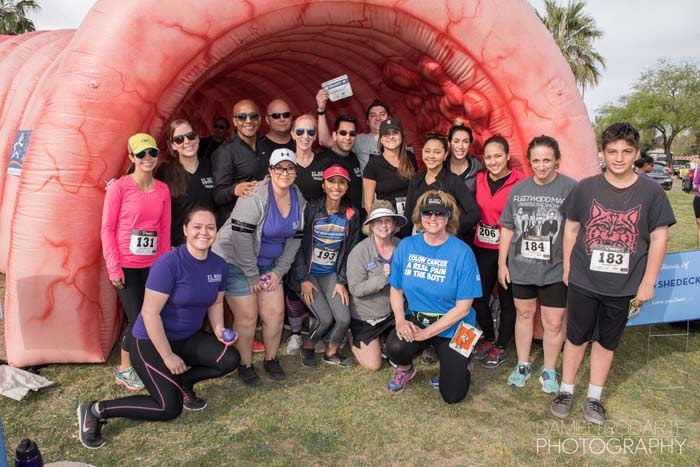If you think that only old people get colon cancer, think again.
And if talking about colon cancer makes you uncomfortable, survivors and volunteers would like to point out that conversations — along with education and early screenings — are key to reducing the 53,000-plus deaths that occur nationwide annually as a result of the disease.
“I always used to think colon cancer was an old man’s disease — that only old men get it, but that’s not true. Colon cancer is the number-two cancer killer in the United States — second to lung cancer — and that is why people need to be aware of the symptoms. Colon cancer is silent until it is not, and then it can be too late, which is why it is important that people get educated and get screened,” said Debbie Wallace, who is working with fellow volunteer Julie Glass to organize Get Your Rear in Gear Tucson 5K Run/Walk on March 11 at Reid Park.
Wallace, who was diagnosed with Stage IV colorectal cancer at age 44 in 2014, has made it her mission to spread the word about symptoms of colorectal cancer, which can include change in the stool; change in the shape or color of stool, including blood or darkened stool; bleeding from the rectum; stomach discomfort or cramping; anemia; or unexplained fatigue, weakness or weight loss.
Wallace emphasized the symptoms are often attributed to common stomach ailments or other conditions.
“I had one incident in May 2013 with lots of blood that I thought was something I ate. I just brushed it off and didn’t want to get tests and thought, ‘If it happens again, I will go to the doctor.’ As time went by, there was pressure and pain in my stomach and then I had another incident in December. ... So after the holidays I went to the doctor for an upper GI scope thinking I had an ulcer and then they did a CT scan to see if maybe it was Chron’s disease. Within the hour they had me on the phone and the next day I found it was already late stage and had spread to my liver,” she said.
Wallace was shocked by the diagnosis, particularly since there is no history of the disease in her family, which can be an important component in risk assessment. About 20 percent of all colorectal cancer patients have a close relative who was diagnosed with disease, according to the American Cancer Society.
Wallace was also unaware that 1 in 10 of those diagnosed with colorectal cancer are under the age of 50, which is the standard age to begin screening by colonoscopy for patients with no family history or other risk factors.
“There are younger people who are battling the disease, and it is terrible, but colon cancer is very treatable. When found in its early stages, the five-year survival rate is 90 percent. But the symptoms are not something people want to talk about: It is not dinner conversation.
“That is why it is important that we raise money to educate people. We are so happy to be providing funds for local education and colon-cancer screenings for at-risk patients through El Rio Health Center,” said Wallace, who has no evidence of the disease after undergoing several surgeries and chemotherapy.
Brenda Goldsmith, El Rio Health Center Foundation executive director, said El Rio is thrilled to be a beneficiary of the fundraiser for the second consecutive year. Last year, the $20,000 gifted to the foundation helped to fund 26 colonoscopies for patients who were underinsured or uninsured.
“We have a big initiative at El Rio to increase our colon-cancer screening rates and have been doing a great job at our health center sites moving that forward. Three years ago our rates were 40 to 45 percent in the targeted age range for colonoscopies. By working with our staff teams to educate community health advisors and with the help of partners like Get Your Rear in Gear, we have increased the screening rates for colonoscopies and (fecal occult blood tests) to over 65 percent,” said Goldsmith.
El Rio’s goal is to reach at least 80 percent — a figure that Goldsmith said will likely become a reality — with the help of community health advisers. These advisers are specially trained to work with the diverse patient population to overcome obstacles to testing, which can range from cultural and language barriers to financial and transportation concerns.
“We have been working hard training our entire team on how to have conversations and normalize these preventative tests that maybe patients are uncomfortable with. We know how prevalent colon cancer is and how treatable it is if it is caught early, and we want to save as many lives as possible,” Goldsmith said.





